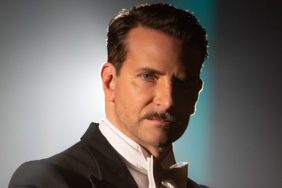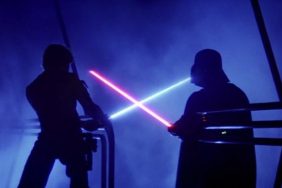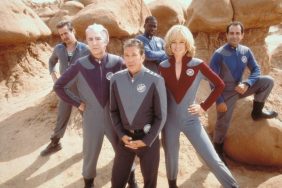We live in an era dominated by motion picture franchises, in which popular (and sometimes not so popular) films are sequelized, transformed into toys, and perpetuated for multiple generations for the financial gain of corporations all over the world. So by this point we’ve seen a whole hell of a lot of movie series, and yet none of them are quite like Star Trek.
The Star Trek movies were a spin-off of the iconic, but short-lived 1960s television series created by Gene Roddenberry, who envisioned a future in which society had abandoned flawed sociopolitical ideas like capitalism, and lived in harmony as they pursued scientific and philosophical progress out in the universe. The crew of the Starship Enterprise visited exciting new worlds, had their ideas challenged by new civilizations, and more-or-less boldly went where nobody (from Earth, anyway) had ever gone before.
Also: Why We Need ‘Star Trek’ Now More Than Ever
Devotees of Star Trek grew in number, fed off of each other’s enthusiasm, and together they invented fandom as we now know it. So Hollywood fed off that enthusiasm to bring the original crew of Star Trek to theaters for six (mostly) successful motion pictures, and when that series came to a close, they were replaced by the crew of the hit TV reboot Star Trek: The Next Generation, which took place 100 years after the events of the original series. And when that petered out, J.J. Abrams found a way to reboot the whole series with new, young actors played iconic old characters, in such a way that all the old continuity remained intact.
Star Trek has been evolving for years, under the guidance of multiple filmmakers and showrunners, and the film franchise has fluctuated in both content and quality over the decades as a result. With the latest film, Star Trek Beyond, now arriving on home video I thought now would be a good opportunity to look back at the whole film series, from its worst installments to its very best, to see how the latest film fits into the franchise as a whole.
Live long and prosper!
13. Star Trek: Insurrection (1998)

Paramount Pictures
The crew of the Enterprise rebels against the Federation in order to protect a very small commune of free spirits, even though we are explicitly told that simply moving them to another planet would save another species from extinction and potentially save billions more lives throughout the galaxy. Meanwhile, Captain Picard dates a 300-year-old woman who never learned how to swim, Worf gets a pimple and Data learns the importance of playtime. Star Trek: Insurrection is a blockheaded endeavor, a soporific and silly tale with forgettable characters and action sequences, whose fundamental premise is so inherently flawed it’s hard to care about it one way or the other.
12. Star Trek Into Darkness (2013)

Paramount Pictures
The second installment in the rebooted Star Trek series brings back one of the original franchise’s most beloved villains, but hides his identity for half the film for no dramatic reason except to keep it a surprise. It was already obvious to most fans that Benedict Cumberbatch was playing Khan from the beginning, but now that the cat’s officially out of the bag the whole first half of Star Trek Into Darkness plays like a waste of time. Later, Abrams’ film tries to evoke the whirlwind emotions of Wrath of Khan, but audiences barely knew these versions of the characters and what’s more, they barely even knew each other, so all of the interpersonal drama falls flat. Add in some terrible plot points that break the whole franchise – like curing death – and huge plot holes like Khan’s entire plan, and you’ve got a film that looks like a big blockbuster but falls apart whenever you so much as breathe on it.
11. Star Trek: Generations (1994)

Paramount Pictures
The time had finally come for the cast of Star Trek: The Next Generation to take over the feature film series, but not without saying goodbye to the original series, in a crossover that sounds like a pretty neat idea until you find out how badly they pulled it off. Star Trek: Generations begins with the death of Captain Kirk and then segues into a rather drab storyline about a mad scientist destroying planets in order to alter the course of an “energy ribbon,” which is also a gateway to “The Nexus,” a place that makes you happy forever. (Never mind that this guy could have flown a ship straight into The Nexus and been done with it.) Kirk shows up in The Nexus and teams up with Picard for one last adventure, an awkwardly staged fight sequence that serves as an unremarkable conclusion to Kirk’s storied career. Star Trek: Generations is entertaining in its smaller moments – like Data’s first experiences with actual human emotions – but it’s pretty asinine whenever the plot kicks in.
10. Star Trek V: The Final Frontier (1989)

Paramount Pictures
William Shatner directed a Star Trek movie, and it’s not one of the good ones. Sure, it’s a bold idea – a mission to the center of the universe, to see if there’s really a God (even though that contradicts the animated series, in which the crew of The Enterprise already went to the center of the universe and met Satan instead) – but a plethora of weird asides run Star Trek V: The Final Frontier aground. Camping trips, cat strippers and the revelation that Spock had an evil half-brother and never thought to mention it, what the heck is going on here? Not much. The cast is as fun as ever, and the handful of moments in which Kirk, Spock and Bones confront their own fears of mortality are surprisingly genuine, but The Final Frontier wasn’t worth the trip.
9. Star Trek: Nemesis (2002)

Paramount Pictures
Star Trek: Nemesis isn’t quite as bad as its reputation, although the film’s problems are glaring and obvious. The film is about a Romulan revolution, led by a clone of Jean-Luc Picard, played by Tom Hardy before anybody knew how amazing he was. His scenes with Patrick Stewart, as they suss out who they are and who – under different circumstances – they could have been are certainly intriguing and their climactic space battle is one of the best of its kind, at least in this movie franchise. But Star Trek: Nemesis plays like a misguided about-face from Star Trek: Insurrection, an attempt to make Star Trek badass again… even though it was never really badass in the first place. The tone is way off (who the heck thought a dune buggy sequence was a bright idea?) and the film’s ignorance of the pre-existing stories – it introduces a new android who looks just like Data and acting like it’s the first time that’s happened, even though Data’s “brother” Lore was a crucial character on the show – comes across like a betrayal of the fans’ trust.
8. Star Trek: The Motion Picture (1979)

Paramount Pictures
Kudos to everyone involved for trying to make the first Star Trek movie feel like a major event. Under the watchful eye of director Robert Wise (The Day the Earth Stood Still), the film has a sense of sci-fi scale that no other installment in this series can touch. Unfortunately, Wise got a little carried away and packed this movie with interminable shots of spaceships, emphasizing their magnitude at the expense of the plot and all the characters. The crew of the Enterprise returns to investigate a vast and threatening new spacecraft, with secrets that shouldn’t be ruined here. It probably would have been a classic episode of the show. As a movie, it’s hard to shake the feeling that it’s a mountain made out of a molehill.
7. Star Trek III: The Search for Spock (1984)

Paramount Pictures
The unforgettable death of Spock at the end of Wrath of Khan paved the way for this interesting and underrated sequel, in which Spock’s consciousness gets shunted into Dr. McCoy’s body, and in which his rejuvenated body is trapped on a strange new planet. The crew of the Enterprise stop at nothing, sacrificing their both reputations and their vessel, to get their friend back, and their success comes at a dire price. The Search for Spock may have a strange story, and it may be a step down after Wrath of Khan, but it’s a corker of a Star Trek movie with high stakes and a memorable Klingon villain, played by Christopher Lloyd.
6. Star Trek (2009)

Paramount Pictures
J.J. Abrams rebooted the Star Trek universe, with a fresh young cast and a whizz-bang blockbuster storyline that pleased crowds even though it sacrificed most of the heavier sci-fi ideas of the franchise. Whatever. This movie pulled off the impossible, starting the whole series over without negating a single previous installment, and re-introducing audiences to iconic characters who still feel more-or-less the way they used to, even though new actors are playing them. An uninteresting villain and a few serious plot holes are a reasonable sacrifice to make to start the franchise off right. (Now if only Star Trek Into Darkness hadn’t doubled down in those departments…)
5. Star Trek: First Contact (1996)

Paramount Pictures
It’s the only great Next Generation movie, but it had to jump through a lot of hoops to get there. The all-powerful Borg are back, fighting a war against the Federation, and just when it seems like the cyborg enemy has been defeated they travel back in time to prevent humanity from going to the stars in the first place. The crew of the Enterprise dash after them, and wind up frantically correcting the timeline and fighting the tyrannical menace simultaneously. Star Trek: First Contact is inventive and exciting, even though the crew – especially Captain Picard, infinitely more traumatized by his Borg assimilation now than he was when it actually happened years ago – are sometimes forced to act completely out of character in order to fit the film’s tacked on Moby Dick motif.
4. Star Trek Beyond (2016)

Paramount Pictures
The problem with rebooting Star Trek as a film series, instead of a television show, is that all the storylines were starting to feel like huge events, and audiences hardly ever got to spend time with the characters. So dialing it back a bit was a smart move for Star Trek Beyond, in which the crew of the Enterprise are trapped on an alien planet and forced to work together in unusual ways in order to survive. The rebooted cast finally shines in a way they never have before. Only the villain is a serious problem here: Krall’s motivation is treated like a third-act twist, making him feel like merely a vague threat – instead of a tangible and interesting one – for most of the movie.
3. Star Trek IV: The Voyage Home (1986)

Paramount Pictures
Star Trek isn’t always about portent. Sometimes it’s lighthearted and funny. In Star Trek IV: The Voyage Home, the extinction of the whales has unforeseen and terrible consequences, so the crew of the Enterprise goes back to the 1980s to find some, and bring them back to the future. It’s more exciting than it sounds. The cast of Star Trek is sublime in this installment, each of them playing their fish-out-of-water schtick with sincerity and charm. What’s more, this is one of the only Star Trek movies in which every member of the crew has a vital part to play in the storyline, as they separate to perform a series of tricky tasks to save the whales, store them, and repair their stolen Klingon ship for the return journey.
2 1/2. Galaxy Quest (1999)

Dreamworks
Galaxy Quest isn’t technically Star Trek, but A) it’s a love note to the whole Star Trek franchise, and B) if it really was Star Trek, it would be one of the best films in the series. It’s worth an honorable mention. The cast of a Star Trek-like series is recruited by real aliens, who have no concept of “fiction,” to save them from an intergalactic despot. They agree and then immediately regret their decision when they have to play out their fantastical parts for real. Eventually they learn that it doesn’t matter if Star Trek/Galaxy Quest/whatever is fictional: if it inspires people, it’s real enough. Dean Parisot’s film features smart writing, a hilarious cast, and a brilliant blend of sincerity and satire.
2. Star Trek II: The Wrath of Khan (1982)

Paramount Pictures
The crew of the Enterprise defeated the villain Khan in an early episode of Star Trek, but their victory backfired, horribly, in Star Trek II: The Wrath of Khan. Now, the despotic leader is back with a plan to destroy Kirk once and for all, leading to a spectacular space battle, an unthinkable death, and one of the best damned sci-fi movies in history. This is broader stuff than the usual Star Trek fare, more interested in thrilling melodrama than in philosophical allegory, but it’s so richly crafted and entertainingly executed that it doesn’t hurt the movie. Except for the fact that it leaves the #1 spot open for…
1. Star Trek VI: The Undiscovered Country (1991)

Paramount Pictures
Fans of Star Trek sometimes argue over which film qualifies as “the best,” and most of these opinions are valid (unless you think it’s Insurrection, in which case you’re just plain wrong). Khan has the best villain. Voyage has the cleverest writing. The Motion Picture has the biggest ideas. First Contact kicks the most ass. J.J. Abrams’ Star Trek is the most crowd-pleasing. Star Trek Into Darkness is, well, the darkest. But for my money, no Star Trek film strikes a finer balance between all of these elements than Undiscovered Country.
The film takes place at end of the Cold War between The Federation and the Klingons, and the crew of the Enterprise are asked to be diplomatic liaisons to an alien race for whom they harbor nothing but animosity. When the Klingon ambassador is assassinated, Kirk and Bones are arrested, and forced to escape from a deadly prison while confronting the fact that their own racism put them there in the first place. Meanwhile, Spock and the rest of the crew are conducting a clandestine investigation that could implicate the highest ranks of the Federation and the Klingon Empire.
The stakes are high, the cast is great, the battles are stellar (no pun intended). But more than all that, Undiscovered Country is the film franchise’s finest hour because it uses all of those entertaining elements to speak allegorically, but candidly, about the world in which we lived. Undiscovered Country came out in parallel with the fall of the Soviet Union, and showed us the perils of letting old grudges stand in the way of lasting peace. It forced the characters to grow in ways they never could before, and in their final, full-length adventure they were able to bring forth lasting change that would cement their legacy and bring their stories to a vital and meaningful conclusion.
That’s my take anyway. What’s yours?
Top Photos: Paramount Pictures
William Bibbiani (everyone calls him ‘Bibbs’) is Crave’s film content editor and critic. You can hear him every week on The B-Movies Podcast and Canceled Too Soon, and watch him on the weekly YouTube series Most Craved, Rapid Reviews and What the Flick. Follow his rantings on Twitter at @WilliamBibbiani.








